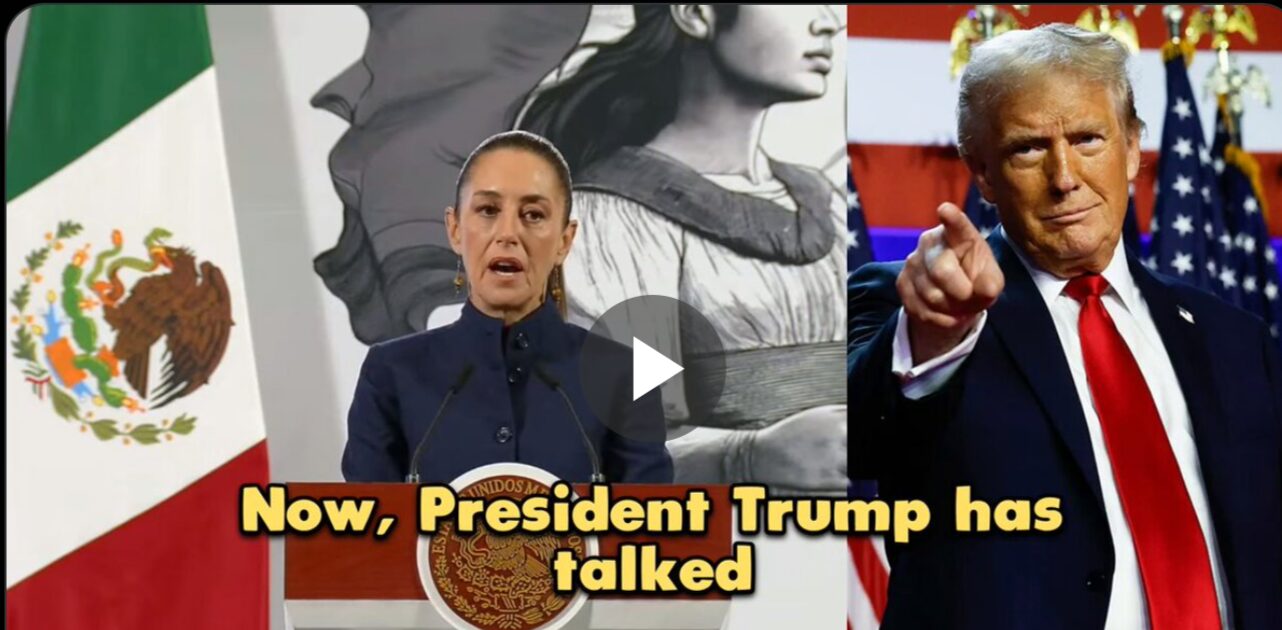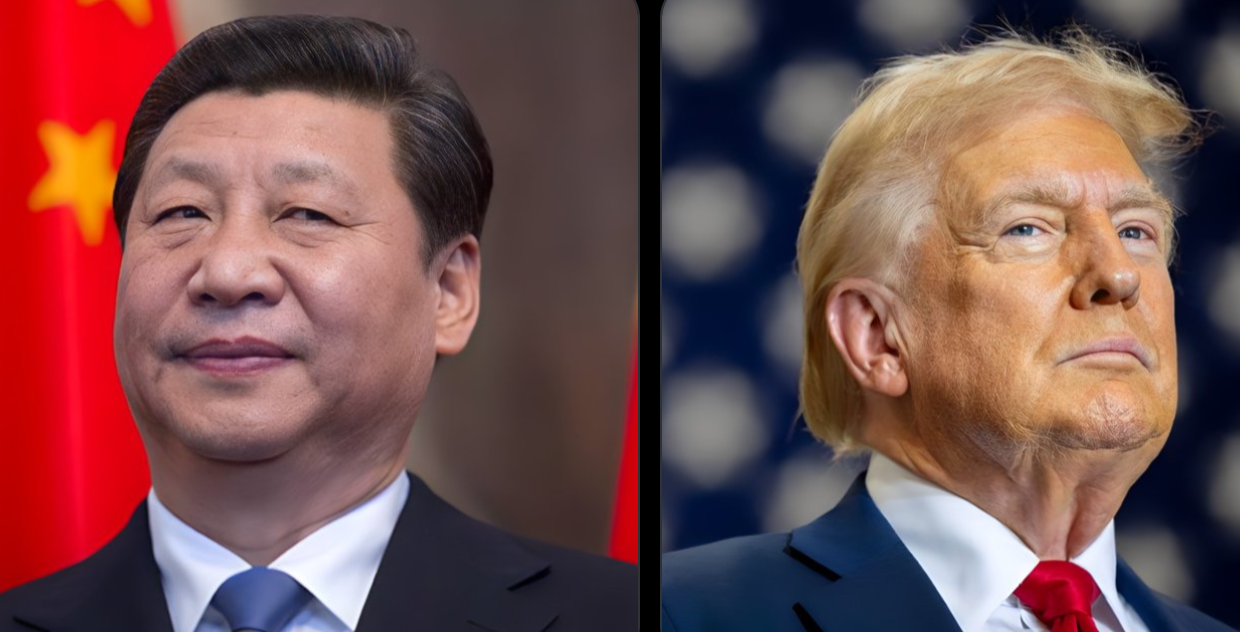Mexican President Sheinbaum says she will allow President Trump to use Mexico as a deportation hub, even for non-Mexican migrants
In a surprising and controversial move, Mexican President Claudia Sheinbaum has publicly announced that she will allow former President Donald Trump, if elected again, to use Mexico as a deportation hub for migrants, even those who are not Mexican. This announcement has already stirred a wave of political debate, both within Mexico and internationally, about the future of immigration policy and the relationship between Mexico and the United States.
While Sheinbaum’s comments are still in the early stages, the proposal to serve as a deportation hub is one that could have significant implications for migration patterns, U.S.-Mexico relations, and the broader regional approach to handling migration issues. In this post, we will explore the details of Sheinbaum’s statement, the political context behind it, and what this could mean for the future of immigration policy in North America.
Sheinbaum’s Surprising Proposal
Claudia Sheinbaum, the newly elected President of Mexico, is known for her progressive stance on many issues, particularly in terms of social justice and economic equality. However, her recent statement about allowing the U.S. to use Mexico as a deportation hub for non-Mexican migrants has raised eyebrows.
In her remarks, Sheinbaum explained that, under certain conditions, her administration would be open to facilitating the deportation process for migrants who had entered the U.S. illegally but were not originally from Mexico. While this could be seen as a pragmatic move to strengthen ties with the U.S., it also represents a significant shift in Mexico’s approach to migration issues.
According to Sheinbaum, the rationale behind this decision is tied to Mexico’s longstanding efforts to work closely with the United States on regional security and immigration management. She emphasized that this arrangement could ease the burden on U.S. immigration systems while ensuring that migrants are safely returned to their countries of origin.
However, the concept of using Mexico as a deportation hub for non-Mexican nationals raises serious concerns about Mexico’s sovereignty, human rights, and the treatment of migrants traveling through the country.
The Background of U.S.-Mexico Immigration Relations
The issue of immigration has been a longstanding point of tension between the United States and Mexico. Historically, the U.S. has looked to Mexico to help manage the flow of migrants crossing the southern border, with varying degrees of cooperation. Under the administration of President Joe Biden, for example, the U.S. has worked with Mexico to enforce border security measures while also pushing for broader immigration reform.
However, the relationship between the two countries has often been strained by the U.S.’s tough stance on illegal immigration, including the construction of border walls and policies aimed at deterring asylum seekers. Former President Donald Trump, in particular, was known for his hardline approach to immigration, including the “Remain in Mexico” policy that forced asylum seekers to stay in Mexico while awaiting their hearings in the U.S. immigration courts.
Sheinbaum’s statement seems to be positioning Mexico as a potential partner in managing deportations more efficiently, but critics argue that this could be seen as giving in to U.S. demands at the expense of the country’s own national interests and the welfare of migrants passing through Mexico on their way to the U.S.
What This Means for Migrants
For migrants traveling through Mexico, Sheinbaum’s proposal raises several key questions. Currently, Mexico serves as both a transit country for those trying to reach the U.S. and a destination for migrants seeking refuge. Many of these migrants are fleeing violence, poverty, and political instability in their home countries, and their journey to the U.S. is often perilous.
By allowing the U.S. to deport non-Mexican migrants via Mexico, there is concern that this could exacerbate the already dire conditions faced by migrants in the country. Mexico has been criticized in the past for its handling of migrant detention centers and its treatment of migrants, particularly those from Central America, Haiti, and other parts of the world.
Some human rights organizations warn that allowing the U.S. to deport migrants through Mexico could lead to an increase in deportations to dangerous regions or force vulnerable individuals into unsafe conditions. Critics argue that Mexico should be working to protect the rights of these migrants, rather than facilitating their removal to potentially hostile environments in their countries of origin.
Furthermore, Mexico’s decision to cooperate with the U.S. on deportations could lead to resentment among migrants who view Mexico as a safe haven during their journey. If Mexico becomes a deportation hub, it may erode trust in the country’s commitment to safeguarding migrant rights.
Potential Legal and Ethical Concerns
The idea of using Mexico as a deportation hub, especially for non-Mexican nationals, also raises important legal and ethical questions. International law, including the principle of non-refoulement under the 1951 Refugee Convention, prohibits the forced return of individuals to countries where they may face harm or persecution. Critics of Sheinbaum’s proposal argue that Mexico could be violating this principle by facilitating deportations to countries where migrants could face abuse, violence, or even death.
The logistics of deporting non-Mexican migrants from the U.S. through Mexico could also present challenges in terms of legal protections for these individuals. There is a concern that this arrangement could circumvent the legal processes that are supposed to protect refugees and asylum seekers. Instead of being allowed to pursue legal asylum claims in the U.S., migrants could be swiftly deported to other countries without due process, potentially denying them their rights.
Moreover, the potential for abuse by both U.S. and Mexican authorities is another issue. Critics argue that, by increasing cooperation on deportations, there could be more opportunities for corruption, violence, and human rights violations along the migration route. Ensuring that the deportation process is fair, humane, and respectful of migrants’ rights would be crucial in any such arrangement.
Reactions from the U.S. and Mexican Politicians
Sheinbaum’s proposal has also sparked a range of reactions from political leaders on both sides of the border. In the U.S., some conservative politicians have praised the idea, viewing it as a way to strengthen enforcement of immigration laws. They argue that having a deportation hub in Mexico could ease the burden on U.S. immigration authorities and send a strong message about the need to control illegal immigration.
However, progressive leaders in both Mexico and the U.S. have expressed concerns about the humanitarian implications of such a policy. In Mexico, many see the move as a betrayal of the country’s commitment to migrant rights. Human rights groups have warned that this could set a dangerous precedent for future cooperation with the U.S. on immigration enforcement, especially if it leads to an increase in deportations without proper oversight or legal protections for migrants.
In the U.S., the announcement is likely to fuel ongoing debates about immigration policy and border security. The proposal may prompt a renewed conversation about how best to manage migration in a way that is both secure and compassionate. While Sheinbaum’s position could be seen as a diplomatic gesture to foster cooperation with the U.S., it will undoubtedly be scrutinized for its potential impact on the people at the heart of the issue: the migrants themselves.
Conclusion: A Controversial Path Forward
Claudia Sheinbaum’s proposal to allow Mexico to serve as a deportation hub for non-Mexican migrants has sparked significant controversy and raised questions about the future of immigration policy in North America. While the move could strengthen ties between Mexico and the United States, it also carries significant risks, both in terms of legal and ethical concerns and its potential impact on migrants’ rights and safety.
As the debate continues, it remains to be seen how this proposal will evolve and what it will mean for Mexico’s relationship with both its northern neighbor and the global community. Whatever the outcome, it is clear that the complex issue of migration will continue to be a defining challenge for leaders in both Mexico and the U.S. in the years to come.

















Post Comment